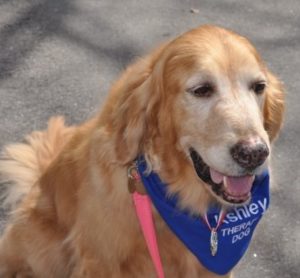Four Legged Therapists
 Animal therapy is becoming widely accepted and more prevalent in today’s society. These four-legged angels come in all sizes and shapes; they are pure bred or mixed; and can be seen at health and day care facilities, college campuses, local schools and libraries. Distinguishing what task a therapy dog is performing can be difficult and not as obvious as a Guide dog in harness.
Animal therapy is becoming widely accepted and more prevalent in today’s society. These four-legged angels come in all sizes and shapes; they are pure bred or mixed; and can be seen at health and day care facilities, college campuses, local schools and libraries. Distinguishing what task a therapy dog is performing can be difficult and not as obvious as a Guide dog in harness.
• Service dogs are individually trained and work as a team with their disabled partner to help them attain the safety and independence from which their disabilities would otherwise limit them. The Americans with Disabilities Act (ADA) ensures the rights of people with disabilities to be accompanied by their service dogs in public places like businesses, restaurants, grocery stores, hotels, etc. Service dog teams should be respected as a working team and not be distracted by the public. Never try to interact with a service dog “on-duty” as you put the owner at risk. In many states it is a criminal offense to permit your dog to interfere with a working team.
• Emotional Support Animals primary roles are to provide their disabled owners with emotional comfort and are not required to undergo specialized training. The seemingly basic gift of companionship and unconditional affection can be just the right therapy to counter a condition like debilitating depression. The ADA does not grant owners of emotional support animals the right to be accompanied by these animals in establishments that do not permit pets; however, the DOJ/HUD’s Fair Housing Act does allow disabled owners of emotional support animals to reside in housing that has a “No Pets” policy.
• Therapy dogs have a completely different type of job and must go through training to be certified. Their responsibilities are to provide emotional or physical therapy to individuals other than their owners. These dogs have stable temperaments and friendly, easy-going personalities. Therapy dogs visit hospitals, nursing homes, and hospices to provide emotional therapy; schools and libraries to give learning disabled children the confidence to read out loud; and group homes and rehabilitation centers to actively participate in physical therapy. Not all dogs are born with the exceptional temperament required to be a certified therapy dog. It can be hard work and the dog needs to be both good at it and enjoy it. A good therapy dog prospect should adore people and want nothing more than to connect with them, possess a physical calm (no barking, pawing or leaping), be non-reactive to loud noises, and non-aggressive to other dogs and pets.
 Finding the type of therapy work that fits your dog’s personality is important as they need to be comfortable and relaxed while performing the task so they can connect with those they are interacting with appropriately. Some canines are very comfortable with children while others love the elderly; some are social greeters who readily look for petting, while others calmly enjoy listening to a story. Before you consider having your dog evaluated, you should ask yourself if your dog has the qualities required to perform as a therapy dog.
Finding the type of therapy work that fits your dog’s personality is important as they need to be comfortable and relaxed while performing the task so they can connect with those they are interacting with appropriately. Some canines are very comfortable with children while others love the elderly; some are social greeters who readily look for petting, while others calmly enjoy listening to a story. Before you consider having your dog evaluated, you should ask yourself if your dog has the qualities required to perform as a therapy dog.
Therapy Dogs International (TDI) and the Alliance of Therapy Dogs (ADT) are two nationally recognized handler/dog therapy certifying organizations. Several smaller umbrella organizations are Project PUP in the Tampa Bay area, Space Coast Therapy Dogs in Brevard County, and Caring Canines Therapy Dogs in Lake County.
GRRMF would like to recognize our four-legged alums who are giving back to their communities by lifting spirits and generating smiles during their visits as a dog handler/therapy team; in reading programs at their local schools and libraries providing motivation for children to become better readers; and helping to raise funds and develop educational awareness. Read about our special pups under our Canine Volunteer link.
